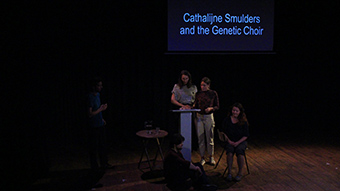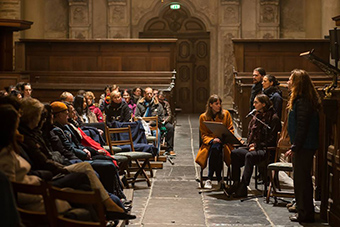APHASIC READINGS
performance (2016-ongoing)
performed by Tamara van Scheppingen and Genetic Choir,
These readings are a play between a aphasic voice, her surrounding and a choir. It's form took shape during my engagements with several people with aphasia. Aphasia is a speaking disorder. Aphasic individuals have difficulty forming speech as a result of brain damage they have suffered from sources like head trauma. Together with them I explored how relations take shape in situations where existing ways of communication are affected by the absence of speech, alterations in tone or voice and interruptions in articulations and rhythm. In situations where words and gestures lose their existing meaning, relations take shape through fragile, physical and complex means of exchange. The porous interplays I encountered, revealed new forms of communication that I wanted to expose. But, instead of symbolically representing the aesthetic of a disordered interplay, I like to approach the moment of the performance as a time and space in which more complex, physical and fragile relations with other are practiced together.
~ A reading of 7 voices
These readings are a play between a disordered voice and her surrounding. Every version is an instantly composed composition between an aphasic voice and group of vocal improvisers in a certain space. Every play begins with the voice of a woman with aphasia. The voice of the woman describes the space that surrounds her. She repeats her herself, hesitates. Other voices appear and echo the voice of the speaking woman. Seven voices circle around in space and interact. The interaction shifts between the voices supporting the woman in her speaking by softening her language disorder, and the voices exploiting the voice of the woman, by highlighting its fragility and absence.
Here
you can see a video documentation
~~ A reading of 6 voices, 30 minutes
Misericordia,
Oude Kerk (NL),
winter 2016
Six voices read an interpretation of the text
Who's my neighbour?
A woman with a speaking disorder speaks in interaction with a choir that echoes the quality of her voice.
I am very thankful to
Tamara van Scheppingen,
Genetic Choir,
Afasiecentrum Amsterdam, Prof. dr. T.A. Abma, Wieke ter Borg and Susan Woelders from the Metamedica department of VuMC Amsterdam.
This is an audio fragment of APHASIC READINGS at the Sandberg Institute.You hear Tamara, a woman with aphasia, initiating an acoustic interplay by serving as the initial sonic and visual focus point of the performance, speaking in a voice that many would identify as disabled. Tamara describes the space that surrounds her. Her distorted speech subtly influences perception. The influence of Tamara's impeded speech on perception is reinforced by the presence of an improv choir. However, in the performance disability gets re-framed as ability and the perfect/imperfect binary gets eradicated as other voices explore the aesthetic affordances of Tamara her speech. The choir gradually begin to sound with the speaker in ways that mirror and affirm her vocal abilities.

APHASIC READINGS, Perdu, 2018

APHASIC READINGS, Oude Kerk, 2016